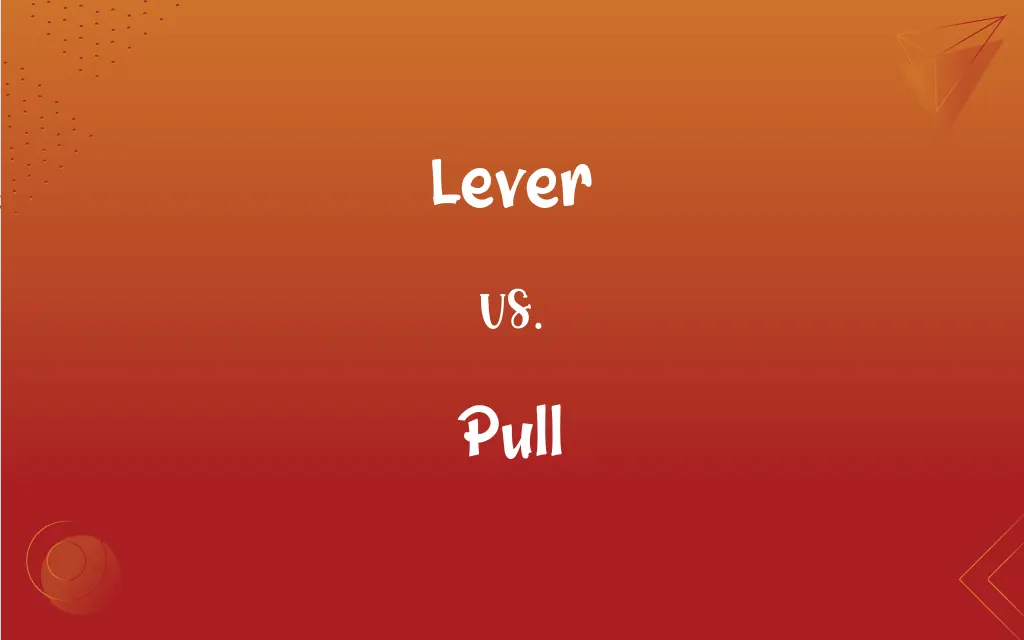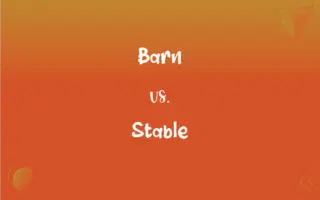Lever vs. Pull: What's the Difference?
Edited by Aimie Carlson || By Janet White || Updated on November 13, 2023
A lever is a rigid bar pivoted on a fulcrum used to transfer force and lift objects, whereas pull is a verb meaning to exert force on something towards oneself.

Key Differences
A lever is a mechanical device, a rigid bar that rotates around a fixed point, known as a fulcrum, to multiply force and move objects. Pull, in contrast, is an action where force is exerted to draw something or someone towards oneself.
Levers are used to increase mechanical advantage, making it easier to move heavy objects with less force. Pulling, however, refers to the act of exerting force on an object to move it closer.
The concept of a lever is fundamental in physics and engineering for lifting or moving loads. Pulling is a more general term and can involve various methods and degrees of force.
Levers can be found in many tools and machines, functioning to transfer force efficiently. Pulling is a basic movement performed by muscles, often used in everyday activities.
Levers are classified into three types based on the relative positions of the fulcrum, load, and effort. Pulling is a straightforward action without such classification.
ADVERTISEMENT
Comparison Chart
Definition
A rigid bar used to lift or move loads
Exerting force to draw something towards oneself
Usage
In tools and machines for mechanical advantage
A basic action performed in various activities
Principle
Based on the laws of physics and leverage
Based on applying force in a specific direction
Types
Three types: first, second, and third class
No specific types, varies by context
Application
In engineering and construction
In everyday tasks and physical activities
ADVERTISEMENT
Lever and Pull Definitions
Lever
A tool for amplifying force.
The crowbar acted as a lever to pry open the door.
Pull
Applying force to handle or object.
Pull the door handle to open it.
Lever
A mechanical device that changes the direction of force.
The lever on the machine made the task easier.
Pull
Drawing something closer.
She pulled the chair closer to the table.
Lever
A rigid bar pivoted on a fulcrum used for lifting.
He used a lever to lift the heavy rock.
Pull
To exert force on something towards oneself.
He had to pull the rope hard to raise the flag.
Lever
A bar used in machinery to initiate movement.
She pulled the lever to start the engine.
Pull
Exerting force to move something.
The children pull the wagon up the hill.
Lever
An object used in a lever system.
The seesaw is a simple example of a lever.
Pull
Tugging or dragging something.
The dog likes to pull on its leash during walks.
Lever
A simple machine consisting of a rigid bar pivoted on a fixed point and used to transmit force, as in raising or moving a weight at one end by pushing down on the other.
Pull
To apply force to (something) so as to cause or tend to cause motion toward the source of the force
Pulled her chair up to the table.
Pulled the wagon down the street.
Lever
A projecting handle used to adjust or operate a mechanism.
Pull
To remove from a fixed position; extract
The dentist pulled the tooth.
Lever
A means of accomplishing; a tool
Used friendship as a lever to obtain advancement.
Pull
To tug at; jerk or tweak
I pulled the lever until it broke.
FAQs
Are all levers straight bars?
No, levers can be various shapes as long as they pivot on a fulcrum.
How does a lever reduce effort?
A lever reduces effort by distributing force over a longer distance.
Can "pull" be used in a non-physical sense?
Yes, "pull" can also refer to an influence or attraction.
Is pulling always an easy task?
The difficulty of pulling depends on the weight of the object and the force applied.
What's an example of a first-class lever?
A seesaw is an example of a first-class lever.
Is pulling necessary in rowing?
Yes, pulling the oars is a key part of rowing.
Can animals also pull objects?
Yes, many animals are capable of pulling objects.
Is a doorknob a lever?
Yes, a doorknob functions as a lever.
What is a lever arm?
The lever arm is the distance from the fulcrum to where the force is applied.
Is pulling a fundamental action in physics?
Yes, pulling is a fundamental action involving force.
What are examples of pulling in everyday life?
Opening doors, drawing curtains, and dragging luggage.
Do levers always make work easier?
Generally, yes, but it depends on the lever's design and the task.
How is "pull" used in software development?
"Pull" is used in version control systems to obtain the latest changes.
How do I choose the right type of lever?
The choice depends on the task and where you need the fulcrum, load, and effort.
Are there safety concerns with levers?
Yes, incorrect usage or overloading can lead to accidents.
Can pulling be automated?
Yes, machines can automate pulling actions.
Can levers be part of complex machinery?
Yes, levers are integral parts of many complex machines.
Does pulling require manual strength?
Often it does, but mechanical aids can reduce the strength needed.
How does fulcrum position affect a lever?
The fulcrum's position affects the force required and the distance moved.
Can "pull" mean attracting in marketing?
Yes, "pull" can refer to attracting customers in marketing.
About Author
Written by
Janet WhiteJanet White has been an esteemed writer and blogger for Difference Wiki. Holding a Master's degree in Science and Medical Journalism from the prestigious Boston University, she has consistently demonstrated her expertise and passion for her field. When she's not immersed in her work, Janet relishes her time exercising, delving into a good book, and cherishing moments with friends and family.
Edited by
Aimie CarlsonAimie Carlson, holding a master's degree in English literature, is a fervent English language enthusiast. She lends her writing talents to Difference Wiki, a prominent website that specializes in comparisons, offering readers insightful analyses that both captivate and inform.































































